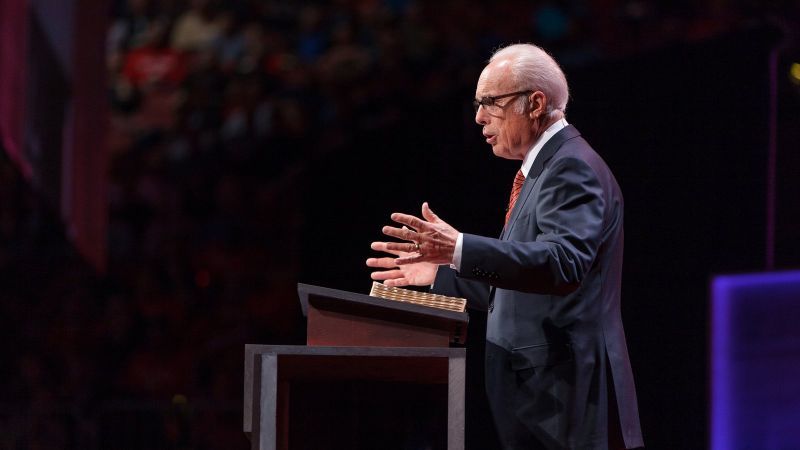John MacArthur has created a ruckus, again. A couple of his recent sermons have seemingly disparaged both democracy and religious liberty, declaring neither to be biblical concepts, at least not strict or necessary ones.
“You say, ‘Well, isn’t religious freedom important for Christianity?’” MacArthur said in a sermon on February 28th. “No, it’s meaningless. It doesn’t matter what law governments make or don’t make. They have no effect on the kingdom of God.” He went on:
The Gospel offends the sinner and seeks to break the sinner’s comfort and contentment by bringing him into stark realization of the eternal judgement of God. Evangelicals have become like Peter. They are looking for alliances with Satan that they think somehow can aid the Kingdom… I told our congregation a few weeks ago that I could never really concern myself with religious freedom. I wouldn’t fight for religious freedom because I won’t fight for idolatry. Why would I fight for the devil to have as many false religions as possible and all of them to be available to everyone?
Not a little irony was present in these musings, considering that Grace Church has recently been the beneficiary of religious liberty protections in court. Some Christian news outlets, to use the term loosely, made sure to not let said irony escape. Fair enough.
Writing for WORLD, Steve West suggested that MacArthur’s comments may have been intentionally hyperbolic and provocative. His central point was almost certainly that, as he said,
Christianity advances whether there is religious freedom or not. And there’ll always be religious freedom for all the lies. Every false religion is going to be free because it’s linked to the kingdom of darkness that operates in the world. And Christians, whatever the label of religious freedom might be in its broadest sense, Christians are always the target even with religious freedom, of the hostility of sinners.
Whatever MacArthur’s intent, there is something beyond kneejerk scorn to be said about his comments. I am no MacArthur acolyte—I don’t even own the study Bible. And though I think Grace Church could have handled the COVID-19 restrictions more tactfully, I’ve (qualifiedly) defended their stance on principle. I think, however, MacArthur’s sentiment on religious liberty could (and should) generate discussion rather than dismissal. Especially from a historical perspective, said sentiments, whether spoken in earnest or frustration, are not as patently ridiculous as some will insist.
***
First, we should note that MacArthur’s opinions, taken in earnest, are far from unprecedented. Up until the eighteenth century, the predominant Protestant consensus was something closer to MacArthur’s newfound stance. Limited as opposed to radical or universal toleration was the accepted wisdom of the day. This entailed a willingness for sects outside of the established church to coexist without state harassment. However, it did not suggest that absolutely any doctrine could be publicly propagated. Dissenting church polity, liturgy, or (to some extent) baptism could be tolerated—all Christian intramural debates, it must be added. What could not be suffered was open heresy, blasphemy, idolatry, and immorality. Behaviors could be regulated if belief could not. And those behaviors that served to subvert the public peace and social cohesion were most egregious. It was thought that universal toleration would most certainly bring these things. These assumptions were present even at the first settlings of America. This was even the case in the separatist colony of Plymouth, and it remained the dominant position in the England throughout the Civil War and into the Interregnum, even amongst many disenfranchised dissenters.
For instance, Nathaniel Ward (1578-1652), author of the Body of Liberties (1641)—a decided improvement on certain particulars in English common law, and generally considered to be the first constitutional document adopted on American soil, which enacted many unprecedented legal protections—called “Poly-piety,” that is, toleration of many pieties, “the greatest impiety in the world.” “There is talke of an universall Toleration,” he said, “I would talke as loud as I could against it.” To him, and most of his compatriots, “universall Toleration,” was toleration of “all hellish Errors.” Ward, like so many other Puritans, had been run out of town by the infamous Archbishop Laud. Yet his brush with an overzealous (and often brutal) champion of the established church in England did not dissuade him in his opinions of the necessity and function of public religion. He and the other founders of Massachusetts Bay, New Haven, and Plymouth would have agreed with MacArthur on this point at least, viz., that the more comprehensive the toleration the more comprehensive the idolatry.
To men of that period, indeed, for most of Christian history, liberty of conscience was distinct from what we would now call religious liberty. No man’s conscience could, in fact or theory, be encroached. Belief could not be forced. This did not entail, however, that all manifestations of conscience were created equal. Conduct, in word, deed, and worship, could justly be regulated according to the established standard, that is, the established church of the locale. That this should be the case was almost a truth of the ius gentium. As John Cotton (1585-1652) wrote in his Discourse on Civil Government (1663), every country then known had some kind of established faith and moral standards, even Islamic nations. No one would have traveled to Turkey, for example, expecting any free exercise of Christianity or Judaism. Why would New (or old) England be any different?
Perhaps all this does violence to the religious liberty narrative anachronistically injected into the Puritan project in New England, but such is history. When, in 1681, an Anabaptist congregation, which had been allowed to quietly coexist in Charlestown, Massachusetts for years, criticized in print the colonial government for its intolerance, they were swiftly chastised. And this especially because they appealed to the example of the nonconformist founders who had allegedly fled the old country for religious freedom. Samuel Willard (1640-1707) disabused the appellants of this notion.
I perceive they are mistaken in the design of our first Planters, whose business was not Toleration; but were professed Enemies of it, and could leave the world professing they died no Libertines. Their business was to settle, and… secure Religion to Posterity, according to that way which they believed was of God.
It was no hypocrisy then for the Puritans of Massachusetts Bay to flee Archbishop Laud in search of freer places. Their aim was not to establish what Roger Williams (1603-1683) later did in Rhode Island, which they detested, but to construct a commonwealth according to their own vision. In so doing, they did not forsake what they would have taken to be a realist position: poly-piety or pluralism could never work, nor was it, to them, desirable. As a founding principle, such chaos of belief would sentence a society to eventual implosion. In short, Willard and other New England patriarchs would have agreed with the patriarch of San Fernando, to permit universal toleration was to invite idolatry. One can certainly debate the assumptions, premises, and conclusions imbedded within this approach to the matter—an approach by and large confined to centuries past—but it must be admitted that a good bit of history is on MacArthur’s side, even in this country.
***
Second, the above feeds into what I’ve argued before (channeling Thomas Pink), namely, that all regimes are necessarily integralist. That is, moral considerations are inevitably prioritized over material ones, and some standard of morality must (and will) govern policy. Like Russell Kirk’s “natural aristocracy,” there will be a natural, if unannounced, established faith and concomitant morality. All societies are religious, it is just a question of which religion. In the end, too, all other competing religions must give way, at least in the things that matter, to the established one. Action, behavior, and conduct must always be regulated by some standard, established values, a moral system.
Arguably, the true experiment of the American founding vis-à-vis the free exercise and establishment clauses was in, through federal covenant, establishing an ecumenical Christian society whilst attempting to mitigate against the denominational strife of Europe that marked the preceding century. By retaining what is commonly referred to as the police power—the authority to legislate for the health, morality, and common good—the states were to serve as the moral centers of the republic.
Therein, prior to the incorporation of the Bill of Rights to the states, religious establishments could endure where they existed, as in the case of Massachusetts, or not endure where they had never cropped up, as in Pennsylvania. In any case, no religious—which is really to say denominational—test would preclude citizens of any state from holding federal office whilst the religious particulars of each locale could continue. It was, for its time, an ambitious arrangement, one that was never really tried. This for various reasons, not least of which was civil war. In many ways, the project was dead on arrival because slavery was not dealt with at the outset, which, therefore, promised eventual conflict. The War for States’ Rights, as some would frame it, ironically, served to finally erode the moral authority of the states.
The point is, in the early years of the young republic, jurists and politicians alike recognized an ecumenical, de facto if not de iure, religious establishment. General Christianity, via the consensus of the states, provided the moral basis for policy and governance. Though fealty to any denomination nor any belief in orthodoxy could or would be coerced, conduct would (and had) to be governed according to some standard. The commentaries of Joseph Story—published in 1833 just as Massachusetts disestablished congregationalism, but which, nevertheless, declared that Christianity was the foundation of the common law—and cases like People v. Ruggles (1811) more than hint at this dynamic. It was not until the tail end of the nineteenth century that New Hampshire removed affirmation of the Trinity from its requirements for state public office. Other state constitutions drafted in the prior century required ascent to the doctrine of divine inspiration of Scripture and in a future state of reward and punishment. In the original model, it could be argued, broadly Christian commitments were meant to be perpetuated from the ground up.
Accordingly, the freedoms afforded to a “religious people” were predicated on certain conditions satisfied by this general, ecumenical Christian morality and belief, not least of which being the natural law to which our founding documents undoubtedly appeal. As this role of Christianity was supplanted, sometimes intentionally other times unintentionally, so too was the original meaning and purpose of the accompanying rights. That’s one theory, anyway, and I think it a plausible one. It is not entirely invalid, then, to say today that religious freedom, per the First Amendment, is devoid of meaning. Or, at least, the meaning has changed in step with the shift in the regime’s moral basis, its religious establishment—which need not be always explicitly recognized nor enforced by anything besides the soft power of social pressure and the like; indeed, this was always the American way it seems.
***
Third, many Christians are now waking up to the fact that religious liberty, like other first amendment privileges, are fragile and necessarily dependent on a certain intellectual and convictional milieu. Like free speech, freedom of religion makes less and less sense in a so-called post-truth society. What’s more, both sides of the same freedom coin, if you will, can turn cannibalistic when my truth is not your truth. (Of course, Christianity itself has not been immune to postmodern and deconstructionist influence.)
When freedom becomes an end in itself, rather than an instrumental good oriented unto a higher good, then the instrument is often misused. It is no wonder that words are now often considered violent. So, too, are “religious exemptions.” That is, protection of speech and religion are cast as carveouts rather than the norm, carveouts that provide legalized cover for bigotry. In this environment, such freedoms cannot endure, at least not in their ideal form. Hence, these rights are increasingly relegated to private expression and practice, where they are less likely to hurt anyone, which is to say, run afoul of the newer orthodoxy with which they may not jive. Absent old religious assumptions, the logic and necessity of such protections appear increasingly outdated and suspicious.
Christians have relied upon the preservation of such exemptions, usually won in courts of final appeal, for so long that they’ve forgotten how to engage substantively in the “culture wars.” Now, they are at sea, for they no longer dominate in the courts, despite a few victories here and there—for instance, religious organizations are still allowed, for now, to define the confines of their own ministries and its offices.
Ryan Anderson has recently lamented this development, that Christians remember only how to appeal to words on a paper, and not the well-reasoned principles that give them life—something Hadley Arkes foresaw decades ago—nor how to pursue substantive ends for the common good. (Liberties, in the classical understanding from which the founders breathed deep, always implied more than mere self-indulgent license.) First Amendment court victories are welcome and important but nearly not enough, Anderson rightly argues. All of them can be undone and they do not determine the underlying substantive issues at stake within these proxy wars.
Thus, we’ll need litigation and legislation not solely on religious liberty, but on the substantive issues at stake: privacy and safety in single-sex facilities, equality and fairness in single-sex sports, and good medicine based on the realities of our biological make up as male or female human beings. Through litigation and legislation, we need to make it clear that it’s lawful to act on the convictions that we are created male and female, and that male and female are created for each other, that no institution has to let males compete against females in sports, that no institution has to allow males into women-only locker-rooms and shelters, that no physician has to engage in so-called ‘gender-affirming’ care.
Christians today need two things. First, they need to adopt for themselves a substantive vision of the common good that necessarily includes moral truth claims and concomitant ends. This they should unashamedly, though meekly, assert in public, rather than simply groveling for the exemption crumbs from the table. It is not intolerant, coercive, nor an affront to the First Amendment to maintain that certain convictions, drawn from Christianity, are the basis of, and necessary to, good government (and especially this government). Second, they must also recover a certain strategery necessary for thriving within unfavorable regimes, whereby both respect for God-ordained governing authorities and positive change can be held in balance, something Catholic social thought has been much sharper on in the past than that of Protestants.
***
John MacArthur is, at least in part, right. Religious liberty, in an environment adverse and foreign to it, has lost meaning. At the same time, Christians have leaned so heavily on that increasingly hollow principle that they’ve forgotten how to cultivate the very environment that supplies it with meaning. This is the strange, ahistorical paradox in which we, and MacArthur, now find ourselves. I doubt MacArthur would fully endorse much of the aforementioned analysis, but it seems that he is on to something, even if he said it rather sloppily. The Kingdom of God needs no aid from human rights to succeed, especially not within MacArthur’s dispensationalist, premillennial paradigm. But it is also the case that many of our human rights, divorced from the Christian assumptions that birthed them, are now more akin to leaky rowboats than an oak-hulled galleon. Their invocation now conjures fear whilst, ironically, their primary use today is that of a cudgel against those they were meant to protect, and the kind of society they were meant to preserve.
This article was originally posted here and is used with the Author’s permission.






















